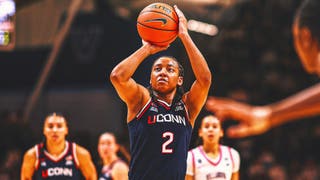Considering its out-of-touch sources, the hyperbole was understandable. Top-flight hockey of any kind inspires that sort of euphoric delirium among those who don't watch our sport often enough. And over-the-top visceral reactions tend to be provoked whenever flags are waved and anthems played at sporting events.
(Full disclosure: I'll root for anyone and anything in any form of competition if you put “USA” on his, her or its back. I get it. Many of us are hard-wired that way.)
But the best hockey that ever has been played? Sorry, the Olympics didn't provide that two months ago. By its very nature, it couldn't.
Scintillating? Undoubtedly. Memorable? Without question.
But as relentlessly breathtaking as any of the Battles of Alberta? Uh, no. As repeatedly riveting as Rangers-Devils in 1994? Not a chance. As raw as Philly-Boston in the '70s or Montreal-Quebec in the '80s or Detroit-Colorado in the '90s? No, no and no.
And for everything that makes high-caliber, high-stakes hockey as good as sports gets, the two weeks of the 2010 Winter Olympics can't match the first five days of the 2010 Stanley Cup Playoffs.
That's not a knock. That's just the inevitable on-ice difference between what happens when teams of NHL All-Stars and teams full of players who, in all candor, aren't good enough to play in the NHL, come together for two weeks once every four years and what happens when men who have spent six months forging personal bonds, team identities and individual rivalries clash every other night for two weeks.
There was nothing not to love about the 2010 Olympics. Like the three previous Games in which NHL players were included, the Vancouver Games provided a rare opportunity to watch just the best 140 NHL players -- in other words, the best 140 hockey players in the world -- compete without restraint for a prize they consider worthy of any sacrifice.
The Vancouver Games gave us the geopolitical history of Russia-Czech Republic and the big brother vs. little brother ramifications of US-Canada and Sweden-Finland on Rivalry Sunday. And the latest installment of the “our way is the right way” philosophical clash in the Canada-Russia quarterfinal. And a superb gold medal game that reinforced that the current top contenders for international hockey supremacy are Canada and the United States.
It was a privilege to sit rink side for those daily triple-headers and then report back for NHL.com. My press credential for the tournament -- and, in particular, the ticket required to cover the final game -- are possessions that will be prized forever.
But it was no coincidence the sides that played for gold were the only two in the tournament comprised exclusively of NHLers. Rather, that should have been a hint to all those appropriately caught up in the moment of what kind of a show those players would put on once the Stanley Cup Playoffs began.
The Olympics fortnight gave us Anaheim's Jonas Hiller somehow getting Switzerland into a shootout vs. Canada. The first five days and nights of the 2010 Stanley Cup Playoffs already have given us Colorado's Craig Anderson heisting one from San Jose and Philadelphia's Brian Boucher winning a game in which his teammates launched only 14 shots at the opposing net.
In Vancouver in February, Canadian fans had two games in which to develop a healthy, but-only-temporary, distaste for American center Ryan Kesler. In Vancouver and Los Angeles during these two weeks, Kings fans get a face full of the Canucks prickly pivot every other night, developing enmity that won't soon fade.
The Olympics challenged Roberto Luongo to begin to prove his big-game mettle by backstopping the most powerful team in the tournament for four games. The playoffs will demand that Luongo prevail in four best-of-seven rounds before his name dare be mentioned in the same breath as fellow Quebec-trained legends Patrick Roy and Martin Brodeur.
Alex Ovechkin stopped Jaromir Jagr cold at center ice with a game-changing bodybomb and Ryan Miller repelled wave after wave of Canadian attackers in round-robin Olympic games in which nobody faced elimination. There already have been a dozen comparable thunderclaps -- shrugged off by the players who were walloped -- among the average of 63 hits delivered per playoff game and at least a half-dozen comparably defiant goaltending performances, all in games in which losing brings elimination ever closer.
The Olympics gave us one home team -- albeit one supported by an entire, hockey-crazed nation -- and 11 visiting teams who had pockets of diehards wearing their colors, singing their songs and waving their banners in the temporarily-renamed Canada Hockey Place. The Stanley Cup Playoffs give us 16 home teams, each with some uniquely unifying manifestation of civic pride -- from white outs to hurled octopi -- and 16 road teams, each having to somehow perform in environments in which they are surrounded by 18,000-some people howling for their demise.
The Olympic hockey tournament, sadly, is over almost before the elimination games begin. Precisely because it is so good, it leaves you wishing there could be more.
More arrived last Wednesday night and will continue bringing it until whoever is left standing is about to drop from exhaustion. The best hockey ever played? The 2010 Stanley Cup Playoffs have only just begun. But already, they're making their case.








































